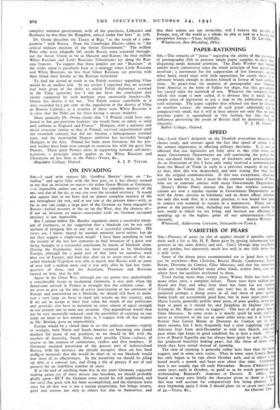ON INVADING
read with interest Mr. Geoffrey Bowles' letter on " In- vading " and agree fully with the first part, as it has always seemed to me that an invasion en masse—by either Great Britain or Germany, —is impossible unless one or the other has complete mastery of the sea, and also of the air, at any rate over the invaded territory. It would also appear that as we have had an almost complete mastery of the sea throughout the war, and at any rate at the present time—with, as far as one can judge, a large part of the German air force engaged in Russia—partial mastery in the air on the West, that the chances of— if not an invasion en masse—successful raids on. German occupied territory is not impossible.
But I cannot follow Mr. Bowles' argument about a successful block- ade of Germany, or his suggestion that a blockade can be our only method of bringing this or any war to a successful conclusion. His views are, I know, shared by another eminent naval writer, but do not they suggest a single-track mind? I have been searching in vain the history of the last few centuries to find instances of a great war being brought to a successful conclusion by means of blockade alone. During the Napoleonic wars we were supposed to be blockading Europe, although for a good part of that time we ourselves were shut out of Europe, and find that after six or seven years of this so- called blockade Napoleon was able to march into Russia with an army of over half a million men, and it was only after he had lost three- quarters of these, and the Austrians, Prussians and Russians turned on him, that he fell.
Again in the Great War, although our sea power was undoubtedly a considerable factor in weakening Germany, it was only when the Americans arrived in France in strength that the collapse came. If we were to give up the idea of active intervention of the continent of Europe and concentrate on a blockade, we should still have to main- tain a very large air force to repel any attacks on this country, and, if we are to accept at their face value the words of our politicians and generals, also have to maintain an army almost of equal strength to our present one to meet any invasion. Our expenditure would thus not be very materially reduced—and the possibility of carrying on our trade on more or less normal lines is, I suggest with all due respect to Mr. Bowles, quite an impossibility.
Europe would be a closed door to us—for political reasons—rightly or wrongly, both North and South America are becoming also closed markets for many of our products, so we should be left with the markets of Australia, South Africa and possibly China—subject, of course to the menace of submarines, raiders and dive bombers. If Germany retained possession of the greater part of industrialised Russia, with the territory she already occupies, there are few food stuffj or materials that she would be short of, so our blockade would lose most of its effectiveness. In the meantime we should be piling up debt at a colossal rate, and living a life of penury if not of real poverty for an indefinite number of years.
If at the end of anything from five to ten years Germany suggested making peace out of sheer misery ana boredom, we should probably gladly agree—BUT the German army would be still undefeated, and not until that great task has been accomplished, and the Germans learn once for all that war is not a paying proposition, but brings misery, grief and sorrow not only to others but also to themselves, and
that their armies are not invincible, will I believe the peoples e( Europe, nay, of the world as a whole, be able to look to a happy and


























 Previous page
Previous page